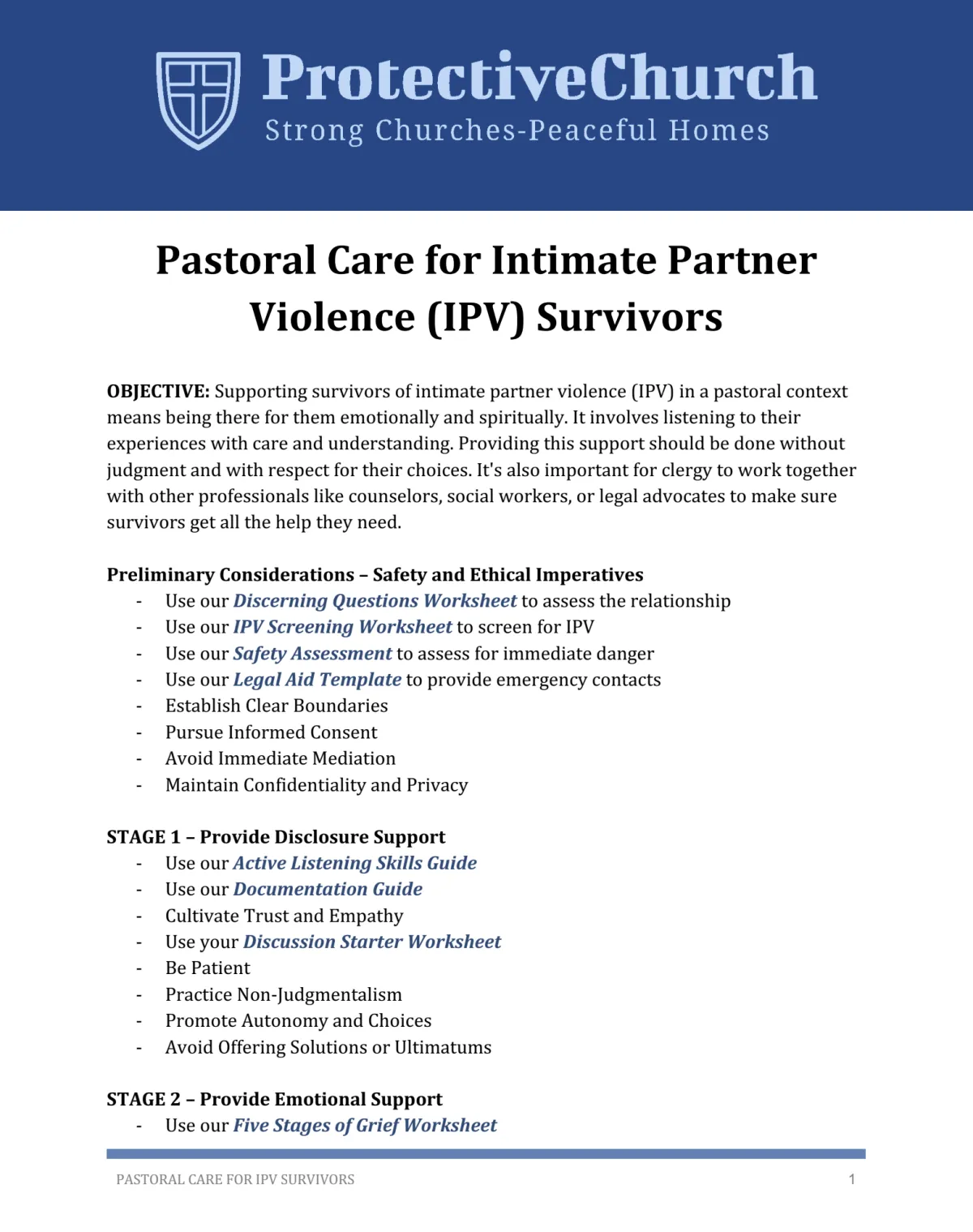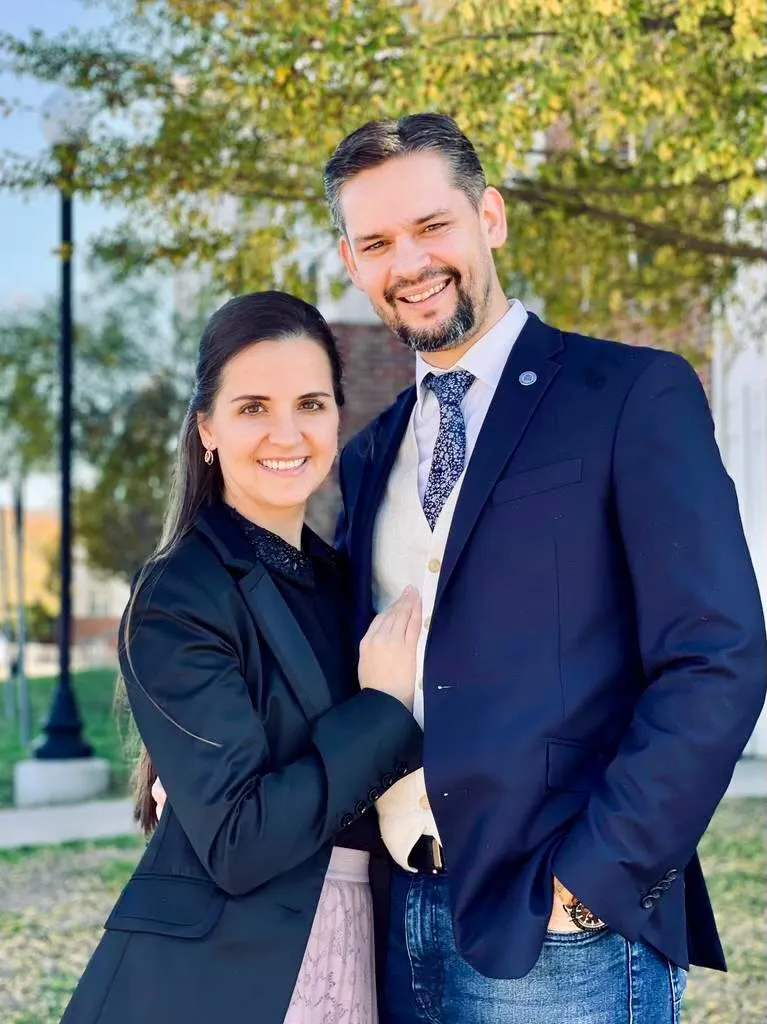Welcome
Pastor, We know you're a faithful and compassionate Person...
According to the National Intimate Partner and Sexual Violence Survey (NISVS),
1 in 3 women and 1 in 4 men have experienced severe physical violence by an intimate partner. What if we told you that these numbers apply to our congregations, too?
A 2002 study showed at least the same prevalence of partner abuse among Christian and non-Christian marriages. Furthermore, a survey conducted in 1992 found that spousal abuse occurs at equal rates across all Christian denominations. What if 30% of the women in your church dread returning home after the Sunday sermon because it means returning to a living hell?
That's why we started ProtectiveChurch Ministries. Follow the link below to download our free guides on how to care for domestic violence victims in your congregation. Also, sign up below for our 8-week online course on Intimate Partner Violence Prevention for Religious Leaders. We will provide you with all the knowledge, skills, and tools to support abuse victims in your church family.
Caring for the oppressed is the most faithful and compassionate way
to seek the kingdom of God and His righteousness.
Intimate Partner Violence Prevention Course for Religious Leaders (online)
Our course on intimate partner violence prevention is the product of several years of doctoral research on domestic violence, a thorough investigation of more than 800 academic articles and books on the subject, and over a decade of practical experience supporting victims in the church context. You will get access to more than 25 worksheets, templates, and guides to effectively care for abuse victims in your congregation. The length of the course depends on your specific needs. A maximum commitment of 3-4 hours per week is required. Click the link below to schedule a call.
OUR SERVICES
Download Our Free Resources

Shielded Love
According to the National Intimate Partner and Sexual Violence Survey (NISVS), 1 in 3 women and 1 in 4 men experience abuse at least once in their lifetime. In this book, I’m going to present five steps on how spouses can protect themselves and their marriages from Intimate Partner Violence.

Pastoral Care Guide
This step-by-step guide equips you with the necessary structure to provide compassionate and effective pastoral care to individuals affected by intimate partner violence in your congregation. It offers practical advice on how to connect survivors with appropriate resources and support networks.
Testimonials

"You were the only ones who believed me and listened to me. Without you, I don't know where I would be today."
Vincent Phelps

"Thank you for listening to me. You were the first people I trusted with my story."
Alicia Rogers
Our Team

Andreas and Anna
Andreas and Anna share the same passion for supporting domestic violence victims. Throughout their work in the church context, they have witnessed abusive marriages being transformed into relationships of growing mutual trust and empathy. They have seen survivors, after decades of emotional, physical, and sexual abuse, finding comfort and healing in God and their faith communities.
Andreas is currently pursuing his Ph.D. in Biblical Counseling at Southwestern Baptist Theological Seminary, where he also earned his Master’s Degree in the same field. He likes nothing more than translating his thorough academic research on Intimate Partner Violence into clear, easy-to-follow instructions for pastors and congregations. His goal is to help them fulfill their calls as shepherds and advocates for those who cannot speak for themselves.
FAQS
Does domestic violence really occur in Christian marriages?
Yes, domestic violence occurs in Christian marriages, just as in any other type of relationship. Abuse does not discriminate based on religion or any other factor. It's essential for you and your Christian community to recognize and address domestic violence. Check out our online course to get all information you need to offer support and resources to victims in your church. We'll show you how you can come alongside domestic violence victims with care, compassion, and confidence, and how you can transform your church into a safe haven for victims.
What are the signs of domestic violence?
Signs of domestic violence includes frequent absences from social events or activities, noticeable changes in behavior or mood, fearfulness or anxiety around their partner, physical injuries such as bruises or broken bones, and attempts to cover up injuries or make excuses for them. Other signs may include isolation from friends and family, financial control by the partner, and a sense of powerlessness or low self-esteem. If you suspect someone is experiencing domestic violence, approach them with care and offer support without judgment. Check out our online course for a more comprehensive understanding of the dynamics, signs, and effects of domestic violence.
How can I as a pastor support domestic abuse victims in my church?
As a pastor, you can support domestic abuse victims in your church by providing a safe and confidential space for them to share their experiences, connecting them with resources such as shelters and support groups, offering pastoral counseling and prayer, and advocating for their safety within the congregation and community. It's crucial to prioritize the safety and well-being of survivors while respecting their autonomy and confidentiality. Check out our online course where we provide all knowledge and tools you need to connect victims with your church and help you establish a safe church environment.


